|
|
||
|---|---|---|
| build | ||
| contrib | ||
| doc | ||
| examples | ||
| lib | ||
| programs | ||
| tests | ||
| zlibWrapper | ||
| .buckconfig | ||
| .buckversion | ||
| .gitattributes | ||
| .gitignore | ||
| .travis.yml | ||
| appveyor.yml | ||
| CONTRIBUTING.md | ||
| LICENSE | ||
| LICENSE-examples | ||
| Makefile | ||
| NEWS | ||
| PATENTS | ||
| README.md | ||
Zstandard, or zstd as short version, is a fast lossless compression algorithm,
targeting real-time compression scenarios at zlib-level and better compression ratios.
It is provided as an open-source BSD-licensed C library,
and a command line utility producing and decoding .zst and .gz files.
For other programming languages,
you can consult a list of known ports on Zstandard homepage.
| Branch | Status |
|---|---|
| master | |
| dev |
As a reference, several fast compression algorithms were tested and compared on a Core i7-3930K CPU @ 4.5GHz, using lzbench, an open-source in-memory benchmark by @inikep compiled with GCC 5.4.0, with the Silesia compression corpus.
| Name | Ratio | C.speed | D.speed |
|---|---|---|---|
| MB/s | MB/s | ||
| zstd 0.8.2 -1 | 2.877 | 330 | 940 |
| zlib 1.2.8 deflate -1 | 2.730 | 95 | 360 |
| brotli 0.4 -0 | 2.708 | 320 | 375 |
| QuickLZ 1.5 | 2.237 | 510 | 605 |
| LZO 2.09 | 2.106 | 610 | 870 |
| LZ4 r131 | 2.101 | 620 | 3100 |
| Snappy 1.1.3 | 2.091 | 480 | 1600 |
| LZF 3.6 | 2.077 | 375 | 790 |
Zstd can also offer stronger compression ratios at the cost of compression speed. Speed vs Compression trade-off is configurable by small increments. Decompression speed is preserved and remains roughly the same at all settings, a property shared by most LZ compression algorithms, such as zlib or lzma.
The following tests were run on a Core i7-3930K CPU @ 4.5GHz, using lzbench, an open-source in-memory benchmark by @inikep compiled with GCC 5.2.1, on the Silesia compression corpus.
| Compression Speed vs Ratio | Decompression Speed |
|---|---|
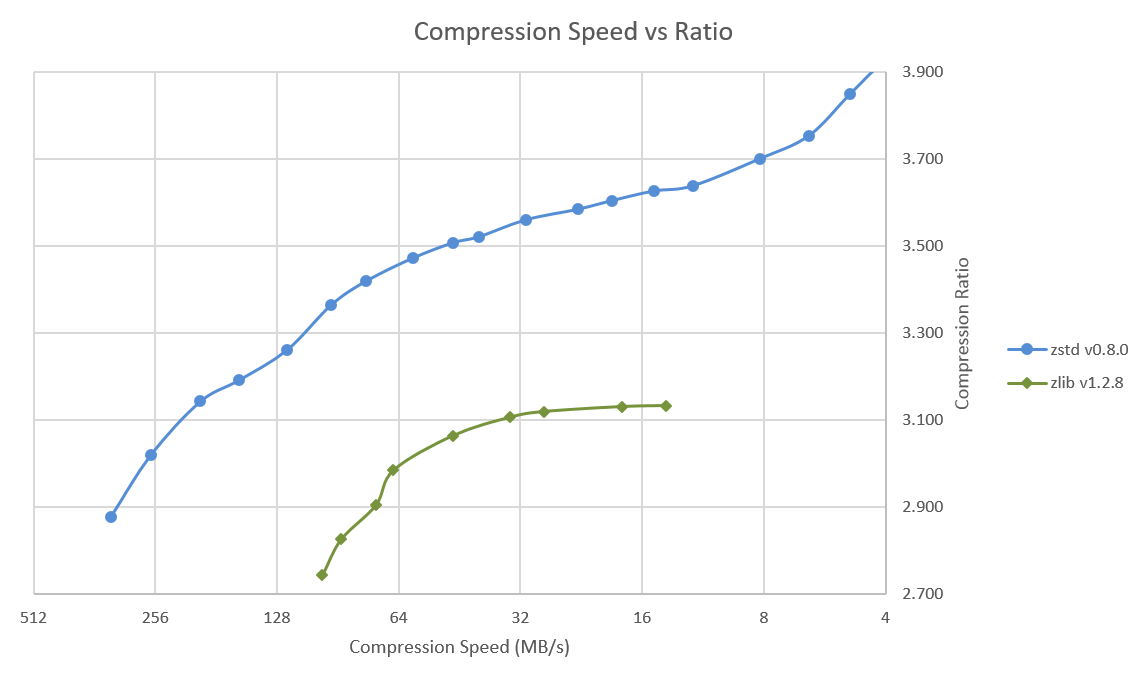 |
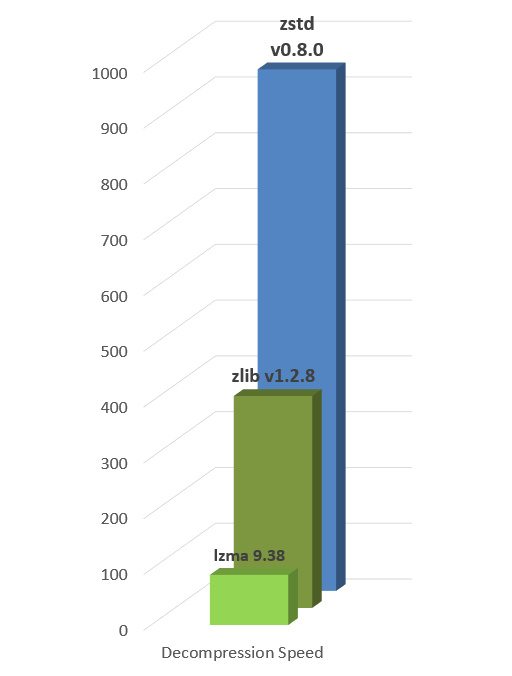 |
Several algorithms can produce higher compression ratios, but at slower speeds, falling outside of the graph. For a larger picture including very slow modes, click on this link .
The case for Small Data compression
Previous charts provide results applicable to typical file and stream scenarios (several MB). Small data comes with different perspectives.
The smaller the amount of data to compress, the more difficult it is to compress. This problem is common to all compression algorithms, and reason is, compression algorithms learn from past data how to compress future data. But at the beginning of a new data set, there is no "past" to build upon.
To solve this situation, Zstd offers a training mode, which can be used to tune the algorithm for a selected type of data. Training Zstandard is achieved by provide it with a few samples (one file per sample). The result of this training is stored in a file called "dictionary", which must be loaded before compression and decompression. Using this dictionary, the compression ratio achievable on small data improves dramatically.
The following example uses the github-users sample set, created from github public API.
It consists of roughly 10K records weighting about 1KB each.
| Compression Ratio | Compression Speed | Decompression Speed |
|---|---|---|
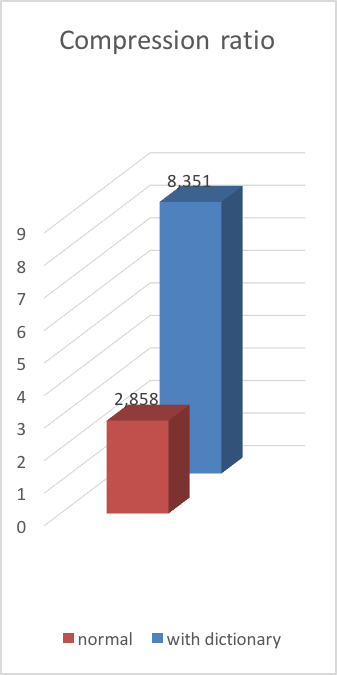 |
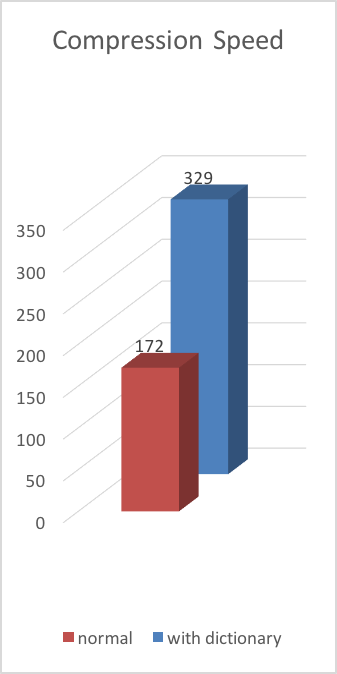 |
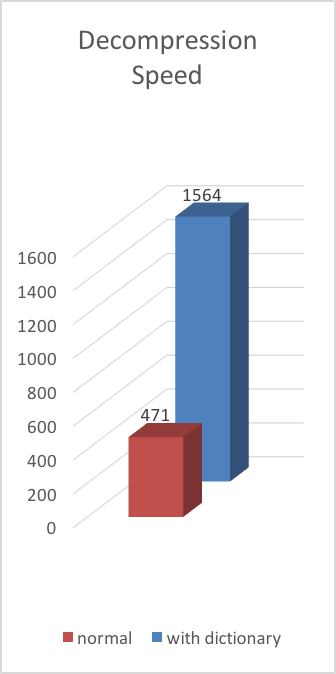 |
These compression gains are achieved while simultaneously providing faster compression and decompression speeds.
Training works if there is some correlation in a family of small data samples. The more data-specific a dictionary is, the more efficient it is (there is no universal dictionary). Hence, deploying one dictionary per type of data will provide the greatest benefits. Dictionary gains are mostly effective in the first few KB. Then, the compression algorithm will gradually use previously decoded content to better compress the rest of the file.
Dictionary compression How To :
- Create the dictionary
zstd --train FullPathToTrainingSet/* -o dictionaryName
- Compress with dictionary
zstd -D dictionaryName FILE
- Decompress with dictionary
zstd -D dictionaryName --decompress FILE.zst
Build
Once you have the repository cloned, there are multiple ways provided to build Zstandard.
Makefile
If your system is compatible with a standard make (or gmake) binary generator,
you can simply run it at the root directory.
It will generate zstd within root directory.
Other available options include :
make install: create and install zstd binary, library and man pagemake test: create and runzstdand test tools on local platform
cmake
A cmake project generator is provided within build/cmake.
It can generate Makefiles or other build scripts
to create zstd binary, and libzstd dynamic and static libraries.
Visual (Windows)
Going into build directory, you will find additional possibilities :
- Projects for Visual Studio 2005, 2008 and 2010
- VS2010 project is compatible with VS2012, VS2013 and VS2015
- Automated build scripts for Visual compiler by @KrzysFR , in
build/VS_scripts, which will buildzstdcli andlibzstdlibrary without any need to open Visual Studio solution.
Status
Zstandard is currently deployed within Facebook. It is used daily to compress and decompress very large amounts of data in multiple formats and use cases. Zstandard is considered safe for production environments.
License
Zstandard is BSD-licensed. We also provide an additional patent grant.
Contributing
The "dev" branch is the one where all contributions will be merged before reaching "master". If you plan to propose a patch, please commit into the "dev" branch or its own feature branch. Direct commit to "master" are not permitted. For more information, please read CONTRIBUTING.
Miscellaneous
Zstd entropy stage is provided by Huff0 and FSE, from Finite State Entropy library.